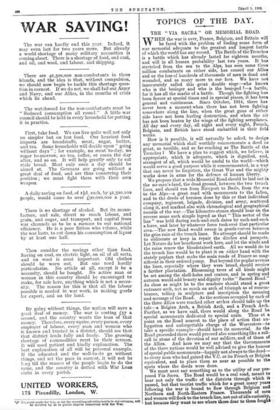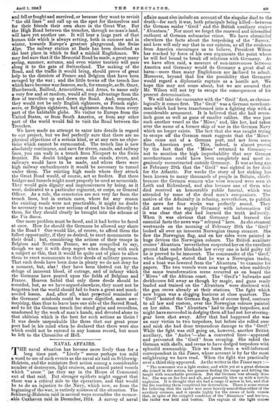TOPICS OF THE DAY.
THE "VIA SACRA" OR MEMORIAL ROAD.
WHEN the war is over, France, Belgium, and Britain will be faced with the problem of finding some form of war memorial adequate to the greatest and longest battle of which the world has any record. The Battle of the Trenches • is a battle which has already lasted for eighteen months, and will in all human probability last two years. It has- stretched from the sea to the Alps, has seen some three million combatants on either side, has caused our Allies and us the loss of hundreds of thousands of men in dead and wounded, and as many -more to our - foes. We have not inaccurately called this - great double siege—who knows who is the besieger and who is the besieged ?—a battle, for it has all the marks of a battle. Though the fighting has been fiercer at special times and in special places, it has been general and continuous. Since October, 1914, there has never been a moment when there has not been fighting somewhere along the line, when the great guns of either side have not been hurling destruction, and when the air has not been beaten by the wings of the fighting aeroplanes. All day and every day, all night and every night, French, Belgians, and British have stood embattled in their field works.
How is it possible, it will naturally be asked, to design any memorial which shall worthily commemorate a deed so great, so terrible, and so far-reaching as The Battle of the Trenches ? We have a plan to suggest which, we believe, is appropriate, which is adequate, which is dignified, and, strangest of all, which would be useful to the world—which would serve a good purpose while it commemorated, in a way that can never be forgotten, the Great War and the mighty works done in arms for the defence of- human liberty.
We propose that a wide Memorial Road should be laid out in the no-man's-land, the dead ground, between the two trench lines, and should run from Nieuport to Basle, from the sea to the Alps—a great road with monuments to the fallen, and to the deeds of heroism done by this or that individual company, regiment, brigade, division, anti array, scattered along it, and marked also with chronological and geographical records of the war.—The kilometre-stones should bear on the reverse some such simple legend as that "This sector of the line" was held during such-and-such dates by such-and-such a force, and later by whatever force took over that particular area.—The new Road would sweep in gentle curves between the grim ruin of the trench lines. No attempt should be made to obliterate or keep in repair the ditches and parapets.
Let Nature do her beneficent work here, and let the winds and the rains renew the bloodstained earth. All we would, do to the trench line would be to plant it on- either hand with the stately poplars that make the main roads of France so mag- nificent in their ordered pomp. But beyond the poplar avenue the lines, especially where they were broad, should receive a further plantation. Blossoming trees of all kinds might be set among the shell-holes and craters, and in spring and autumn would: add beauty and dignity to the "Sacred Road."
As close as might be to the seashore should stand a great entrance arch, not so much an arch of triumph as of remem- brance, telling in sculpture and inscription the meaning and message of the Road. As the sections occupied by each of the three Allies were reached other arches should take up the tale—a Belgian Arch, a British Arch, and a French Arch. Further, as we have said, there would along the Road be special monuments dedicated to special units. Thus at a point on the Road nearest to the place of action that un- fqrgotten and unforgettable charge of the Worcesters—to take a specific example—should have its memorial. As the Road proceeded there would proceed also something like a roll- call in stone of the devotion of our soldiers, and of those of the Allies. And here we may say that the Governments of the three nations would be well advised to give the honour of special public monuments—happily not always to the dead— to every man who had gained the V.C. or its French or Belgian equivalent, and to place them as near as possible to the spots where the deeds were done. We must next say something as to the utility of our pro- posed Via Sacra. The Road would be a real road, meant to bear not only the traffic of the districts through which it passed, but that tourist traffic which for a great many years following the war is bound to flow through Belgium and Northern and North-Eastern France. Thousands of men and women will flock to the trench line, not out of idle curiosity, but because they want to Bee where those dear to them fought and fell or fought and survived, or because they want to revisit "the old lines" and call up on the spot ior themselves and for their friends their own share in the Great War. But the High Road between the trenches, throng]; no-man's-land, will have yet another use. It will bear a large part of that human tide which is always setting, both in summer and in winter, towards Europe's greatest playground, the Swiss Alps. The railway station at Basle has been described as the best place in which to find a mislaid Englishman. We may feel sure that if the Memorial Road be made, a great many ,sprmg, summer, autumn, and even winter tourists will pass • along it to the gate of Switzerland. The making of the Road, and the traffic it would bring, should prove of great help to the districts of France and Belgium that have been ravaged by the war ; and the little towns off the trench line which have become war-famous, such, for example, as St. Omer, Hazebrouck, Bailleul, Armentieres, and Arras, to name only a very few and at random, would all reap advantage from the flow of travellers up and down the Road. And, remember, they would not be only English sightseers, or French sight- seers, or Belgian sightseers, but sightseers .drawn from every part of the habitable globe. No visitor to Europe from the United States, or from South America, or from any other part of the world would fail to visit the Road between the Trenches.
We have made no attempt to enter into details in regard to our project, but we feel perfectly sure that there are no physical objections of a serious kind, or at any rate no objec- tions which cannot be surmounted. The trench line is now absolutely continuous, and save for rivers, canals, and railway lines, you can walk in a trench from Nieuport to the Swiss frontier. No doubt bridges across the canals, rivers, and railways would have to be made, and where there were high railway embankments it would be necessary to tunnel under them. The existing high roads where they struck the Great Road would, of course, act as feeders. But these bridges and tunnels might most properly be used as memorials. They would gain dignity and impressiveness by being, as it were, dedicated to a particular regiment, or corps, or General Officer. As a rule, the cemeteries are not very far from the trench lines, but in certain cases, where for any reason the existing roads were not practicable, it might no doubt be necessary to make new sections of road to lead directly to them, for they should clearly be brought into the scheme of the Via Sacra.
One more problem must be faced, and it had better be faced at once. How far should the Germans be allowed any share in the Road ? One would like, of course, to afford them the fullest opportunity, if they so desired, to erect monuments to their dead ; but, considering the actions of their troops in Belgium and Northern France, we are compelled to say, though we say it with deep regret when dealing with such a subject as this, that it would be quite out of place to allow them to erect monuments to their deeds of military prowess. That such deeds have been done in plenty we do not deny for a moment, but, alas I they have been blotted out by the deluge of innocent blood, of outrage, and of infamy which the Germans have poured upon the fields of Belgium and France. Heaven forbid that only these deeds should be recorded, but, as we have argued elsewhere, they must not be forgotten lest the world should fail to learn a great and much- needed lesson. And, after all, what perpetual reminder of the Germans' misdeeds could be more dignified, more awe- inspiring, than thus to leave bare one side of the Sacred Road, and to let the German trench line stand grim and recordless, unadorned by the work of man's hands, and devoted alone to that oblivion which is the best for such actions as theirs ? It was deeds unspeakable like these that our great prose poet had in his mind when he declared that there were sins which could not be entered in any human record, but must be left to the Chronicles of Hell.































 Previous page
Previous page